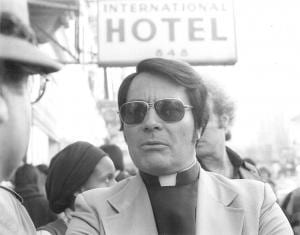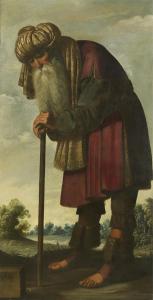
The long book of Jeremiah is at times a very loose collection of sayings from various Israelite traditions. Though one may discover a thread of prophetic biography in the book, from Jeremiah’s call at the beginning to his removal to Egypt toward the end, in between there are all sorts of literary fragments that over the years have attached themselves to the collection. The text for today appears to be one of those. There is finally no way to provide historical context for this passage, so we are left to analyze it on its own literary merits. And those merits, I suggest, are considerable; there are several adages or sayings that are worthy of much reflection.
“Cursed is anyone who trusts in human beings, who makes flesh their strength” (Jer.17:5). The Bible often warns against trusting human beings for safety or comfort, no matter their lofty roles (e.g. kings or princes) in society. However, it is especially potent to suggest that those who do hitch their hopes to the wagons of the mighty are thereby “cursed”. Usually, the antonym for “blessed” (found in vs.7) is “foolish”. To suggest that one is cursed by trusting in humans is to up the ante on the danger of such actions. Not only is it humanly dangerous to play the fool by misplacing one’s trust, it is, claims this author, religiously catastrophic to do so, because one is thereby cursed, whether by the universe in general of by YHWH specifically is not made clear. What apparently lies behind this devastating statement is the continuous experience of the writer that human beings all too often trust in one human or another, rather than in YHWH. The inevitable result of trusting humans is to “turn away from YHWH” (Jer.17:5c). As Jesus later was recorded as saying, “No one can serve two masters.”
The consequence of putting trust in the wrong place is made vivid by the familiar metaphor of pathetic shrubs and long-lived trees. Those who trust in humans only will be like “’ar’ar”, an untranslatable word for some sort of poor plant that lives its life in deserts, unable to see when any “good” comes (NRSV “relief”), trying vainly to grow in “parched” places, uninhabited and sown with salt (Jer.17:6). To the contrary, those who “trust in YHWH, whose trust is YHWH” are like “trees planted near water,” their leaves forever green, their fruit bountiful and continuous (Jer.17:8).
This dramatic contrast between those who trust wrongly and rightly is, of course, a familiar biblical trope. Again, I suggest that it arises from simple observation. Human beings, because they are mortal and fickle and recognizably human in weaknesses and strengths, cannot finally be objects of trust; one can never put final trust in any human being, no matter how grand, glib, or glorious. I just finished a fine book about the extraordinary life and ministry of Jim Jones, The Road to Jonestown, by Jeff Guinn. Here is a cautionary tale, illustrating all too well the dangers of ultimate trust in any human. Jones’ early ministry in Indiana and California was predicated on the desire to break down racial and economic barriers in his Peoples Temple. No one could deny that while others talked a good bit about effecting change in a divided society, Jones, through unbelievable hard work and charisma, actually did something about it, leading many hopeless people to a place of hope and future, a sort of socialist paradise on earth where all were equal in God’s and Jones’ sight. All too soon, however, megalomania, drugs, and madness consumed Jones, and, as we all too well remember, led to the poisoning death of over 900 of his followers, including over 300 children, in a jungle village in Guyana. Not all of these victims went willingly to their death at Jones’ instigation, but many did. Quite literally, they were cursed by death, because they put their trust in Jones. The ancient words of Jeremiah came to horrifying life in the tale of Jim Jones.
Jer.17:9 offers a rather different, but equally trenchant, saying. NRSV reads, “The heart is devious above all else; it is perverse—who can understand it?” Several of the words in this remarkable sentence need explanation. “Heart” in Hebrew anthropology means the seat of will and intelligence; the ancients knew nothing of the brain and its central function in human life. It was for them the “heart” that served as source of our thought and will. By this notion, they did not mean merely the organ of the heart, though when that organ ceased its beating, it was obvious that will and practice ended with it. The translation “devious” attempts to render an elusive word into some sort of English. That word is a rather famous one, ‘aqab, whose basic meaning is “heel,” but whose infamous connection with the name of the patriarch, Jacob, gives it a delicious and slippery tone. I tend to translate the word, as it occurs in Genesis, as “to grab, or take.” Hence, the heart “takes” what it wants, just as Jacob took everything he wanted, leaving father, wife, brother, and uncle in his greedy wake. Thus, says this writer, the human heart is just like Jacob, and is much more than merely devious; it is never satisfied, it grabs for all the gusto it can, and cares little for anyone else.
The second part of vs.9, again in the NRSV, reads: “it is perverse,” though that reading is in my mind not precisely what is said. I translate, “Yes, this is humanity; who can understand it?” The noun, albeit the vowels are differently pointed, is that familiar‘enosh, one of the generic Hebrew words for humanity, or human being. After announcing that human hearts are all Jacob-like, the writer appears to say, “Such are we humans—who can explain it?” The answer appears to be, “No one,” or perhaps “only God.” I sense a sort of weariness here, a kind of raising of the shoulders and a mumbled, “Wat’ch ya’ gonna’ do?” If that is so, then the plea follows right on with the warning about trusting human beings instead of God. Since all humans are Jacob, only a cursed fool would ultimately trust such a one. But so we do, and have long done through the run of human history.
What does it mean to trust God, instead of Jacob? God is creator, sustainer, immortal caretaker of us and God’s cosmos. And God is guarantor of justice and equality among all of God’s creatures, human and animal and plant. And it is God who gives to us the “ministry of reconciliation,” the work for unity and wholeness, devised by God as author and entrusted to us, God’s children. To trust anyone other than that God, to trust any human, is to be cursed to repeat the horrors of human calamity again and again. Locked into these tiny phrases in Jeremiah 17 one can find much of eternal value. I trust that we, Jacob-like though we are, may turn toward God as the only appropriate source and object of our final trust.











